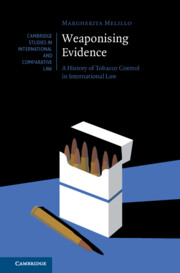9 results
Epilogue
-
- Book:
- Merchants of Legalism
- Published online:
- 19 December 2024
- Print publication:
- 05 December 2024, pp 299-327
-
- Chapter
- Export citation
2 - The Negotiation of the WHO Framework Convention on Tobacco Control
-
- Book:
- Weaponising Evidence
- Published online:
- 11 January 2024
- Print publication:
- 01 February 2024, pp 31-113
-
- Chapter
- Export citation

Weaponising Evidence
- A History of Tobacco Control in International Law
-
- Published online:
- 11 January 2024
- Print publication:
- 01 February 2024
The crisis in international law and the path forward for international humanitarian law
-
- Journal:
- International Review of the Red Cross / Volume 104 / Issue 920-921 / August 2022
- Published online by Cambridge University Press:
- 16 May 2022, pp. 2077-2096
- Print publication:
- August 2022
-
- Article
-
- You have access
- Open access
- HTML
- Export citation
The Responsibility to Protect: Locating Norm Entrepreneurship
-
- Journal:
- Ethics & International Affairs / Volume 35 / Issue 2 / Summer 2021
- Published online by Cambridge University Press:
- 19 August 2021, pp. 197-211
-
- Article
- Export citation
Chapter Eight - Intermediaries as Translators
-
- Book:
- Rule of Law Intermediaries
- Published online:
- 17 April 2021
- Print publication:
- 06 May 2021, pp 178-202
-
- Chapter
- Export citation
2 - Tracing an Idea, Constructing a Norm
- from Part I - The ICC and Complementarity: Evolutions, Interpretations and Implementation
-
- Book:
- Complementarity, Catalysts, Compliance
- Published online:
- 16 April 2020
- Print publication:
- 23 April 2020, pp 27-67
-
- Chapter
- Export citation
Norm entrepreneurship and diffusion ‘from below’ in international organisations: How the competent performance of vulnerability generates benefits for small states
-
- Journal:
- Review of International Studies / Volume 45 / Issue 4 / October 2019
- Published online by Cambridge University Press:
- 22 March 2019, pp. 647-668
- Print publication:
- October 2019
-
- Article
- Export citation
The danger of “new norms” and the continuing relevance of IHL in the post-9/11 era
-
- Journal:
- International Review of the Red Cross / Volume 97 / Issue 900 / December 2015
- Published online by Cambridge University Press:
- 26 April 2016, pp. 1277-1293
- Print publication:
- December 2015
-
- Article
- Export citation

